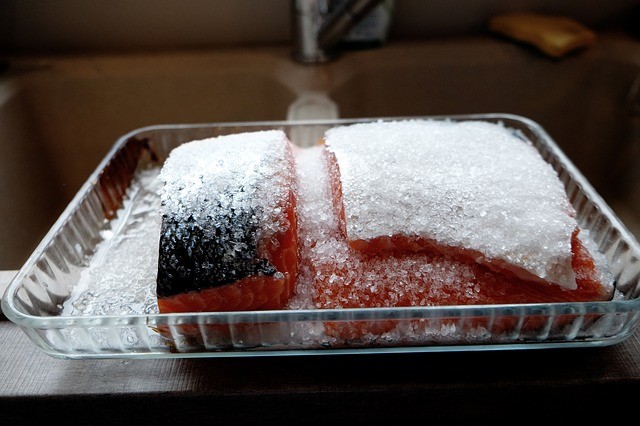Learn if is it safe to return previously frozen food to the freezer or not. Let’s set the record straight and get rid of these myths! Check out the article we found over at Mercola.com.
By Dr. Mercola
Whether or not thawed, if previously frozen foods can be refrozen is one of the most popular questions posed to the US Department of Agriculture’s (USDA) Food Safety and Inspection Service (FSIS) food-safety hotline.
It’s also one of the most widely circulated myths that refreezing food is dangerous.
While putting a thawed piece of steak or brick of cheese back into the freezer might lead to some changes in taste or texture, it’s perfectly safe and poses no risks to your health. There are a few caveats to consider, however.
It’s Safe to Refreeze Thawed Food
Thawed food can be safely returned to your freezer provided it was thawed safely in the first place. The worst way to thaw frozen food is to let it sit out on your kitchen counter. Tina Hanes, a registered dietitian with the USDA’s FSIS, told The New York Times:
“… [B]acteria like it warm, like we do, and multiply rapidly at room temperature. Thawing on the counter is not safe, period. You should never do that.”
In fact, it’s said the greatest factor impacting whether your food is “safe” isn’t whether it’s been previously frozen but rather is related to how much time it spends in the temperature “danger zone” (between 40 to 120 degrees F).
In addition to thawing on the counter, thawing frozen meat, poultry, or seafood by running warm water over it is also risky from a food-safety standpoint. If you need to thaw meat or poultry quickly, it can be run with cold water over it, or submersed in cold water, changing the water every 30 minutes until it’s thawed.
If you use this latter method for thawing, it should be cooked immediately – not refrozen or put back in the fridge. The USDA further advises:
“Once food is thawed in the refrigerator, it is safe to refreeze it without cooking, although there may be a loss of quality due to the moisture lost through thawing. After cooking raw foods which were previously frozen, it is safe to freeze the cooked foods.
If previously cooked foods are thawed in the refrigerator, you may refreeze the unused portion. Freeze leftovers within 3 to 4 days. Do not refreeze any foods left outside the refrigerator longer than 2 hours; 1 hour in temperatures above 90 °F.
If you purchase previously frozen meat, poultry or fish at a retail store, you can refreeze if it has been handled properly.”
Do Frozen Foods Retain Their Nutrients?
It’s generally best to consume foods fresh, as soon after harvest as possible. However, frozen foods aren’t a bad alternative when this isn’t possible. In some ways, frozen foods may even be “fresher” than foods at your supermarket.
This is because produce is typically frozen soon after harvest, whereas fresh produce may be shipped thousands of miles before it actually reaches your local store (with nutrients degrading the entire way).
Research suggests fresh vegetables may lose up to 45 percent of their nutrients from the time they’re harvested to the time they’re purchased at a grocery store. On the other hand, research suggests frozen foods may contain comparable nutrients as fresh foods, and at times be even more nutritious. For instance:
- Frozen broccoli had more vitamin C, lutein, and beta-carotene but lower levels of polyphenols (some frozen broccoli has also been found to lack the ability to produce cancer-fighting sulforaphane)
- Frozen carrots had three times more lutein and twice as much beta-carotene, as well as more vitamin C and polyphenols
- Frozen sprouts had higher levels of all measured nutrients
- Frozen blueberries, green beans, raspberries, and pears also had higher levels of vitamin C and polyphenols
Separate research on frozen versus fresh carrots, broccoli, spinach, strawberries, and more concluded “overall, the vitamin content of the frozen commodities was comparable to and occasionally higher than that of their fresh counterparts.”
The exception in this case was beta-carotene, which declined significantly in some of the frozen produce.
There’s still no question that the most nutrient-rich food will be fresh, provided you can eat in within a short time from harvest (i.e. produce you either grow yourself or purchase from a local farm or farmer’s market). However, frozen foods are still fairly nutritious and worthy of consumption if locally grown fresh foods are not available.
Next Article: Learn Why You Should Freeze Your Lemons!
Read full article: Is It Safe to Refreeze Thawed Food?







The Ultrasound Solution
Apr 09. 2016
Nice ! thanks I love
Bev Mackie
Apr 09. 2016
All my questions answered.
Georgia Jose-Leitman
Apr 10. 2016
Can refreeze if thawed in refrigerator. Do not refreeze if thawed at room temp.